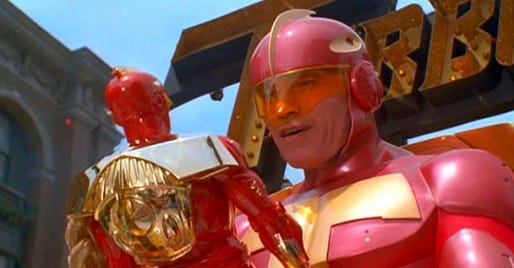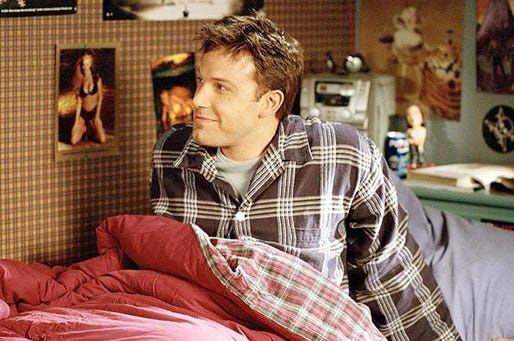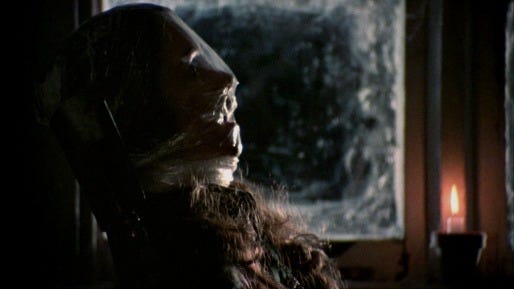A Film Yap Christmas
There are (literally) hundreds of Christmas movies in existence, and we watch fewer than half a dozen of them regularly. If someone says "Quick! Name me three Christmas movies," your list would probably go something like this: "A Christmas Story," "National Lampoon's Christmas Vacation," "It's a Wonderful Life." You may even erroneously say something like "A Charlie Brown Christmas" or "Rudolph the Red-Nosed Reindeer" (these are TV specials, not Christmas movies).
So in an effort to remind you of the breadth of this most festive genre of films, The Film Yap gang got together and offered their insights on few of their personal Yuletide picks, some traditional in nature, some less so. So check out what the Yappers have to say about their favorites, and feel free to share your own, either in the comments of this page, or through one of our social media channels. Maybe you'll alter your own Christmas viewing habits for years to come.
Lauren Whalen: "George Balanchine's The Nutcracker (1993)"
Yes, this is the one with Macaulay Culkin about two seconds before he fell from child-star grace. Yes, it was filmed on a stage. No, it didn't do well at the box office in 1993. And to all of the naysayers, I give my best 90's "Whatever" and pop in the DVD again. Sure, you can go see a local or professional Nutcracker live (and believe me, I do). However, you'll miss out on Balanchine's iconic choreography that made the ballet an American Christmas staple (you know the now ubiquitous cranked-up tree? His idea), as well as the gorgeous, otherworldly New York City Ballet, one of the world's best companies. Watch for Darci Kistler (Balanchine's final protégée before his death) as the Sugar Plum Fairy and Wendy Whelan (who recently retired after 30 years with NYCB, practically unheard of in classical ballet) as the sensual Coffee dancer. This "Nutcracker" is catnip for dance geeks like me and a lovely family-friendly film. And if you hated Culkin, don't be deterred. He's barely in it.
Joe Donohue: "Elf"
While there are a lot of Christmas movies readily available, only a few ever reach classic status, and one of my favorites is "Elf." It's pretty bizarre to think of a Will Ferrell movie as Christmas classic, but his turn as the human-raised elf hits all of the right chords on the old heart strings. "Elf" is also the perfect representation on how our views of Christmas evolve through our lives: a very pure and strong belief in the magic of Santa to a cynical Scrooge. Buddy is the perfect symbol to remind us of the magic in which we once believed. He shows us how to hug without reserve, spin through revolving doors and throw the perfect snowball. Buddy reawakens the child in all of us. Plus, he turned syrup into the next ketchup. "Elf" should be on everyone's holiday viewing list.
Evan Dossey: "Jingle All the Way"

"Jingle All the Way" is the Millennials' Christmas movie. Not because of the content, but because of how it's remembered. The plot: Schwarzenegger has to get a toy for his son. It's the most popular toy in the world. Problem: It's Christmas Eve. Every store has sold out. Problem: Sinbad wants one too. Can you imagine anything more '90s? "Jingle All the Way" isn't exactly a classic, but it's well on its way to becoming one in the nostalgic, ironic lens of the Millennial generation. It encapsulates the way Christmas felt before the Internet was widespread, when toys were the rage and finding them was a newsworthy story. We're the last generation without Internet access; the last one to experience that kind of childhood Christmas.
But what makes "Jingle All the Way" the Millennial Christmas movie is how it persists despite being so awful. It's not smart enough to play as a satire of the toy craze; rather, it ends up glorifying it. Casual homophobia and scenes where Arnold beats up not only a midget Santa, but also Rudolph, make "Jingle All the Way" a heaping holiday helping of bad taste.
I'd argue, though, that we Millennials have a fondness for bad taste. After all, when everything is saved and viewed forever, bad taste is just as useful as good taste. Anything to gain the attentions of your peers; anything to share with them, to bask in the glow of memory and nostalgia. It's all celebration in the end. So gather 'round YouTube and load up "Jingle All the Way." Bask in the horrible, awful people on the screen and laugh along with your friends. Wonder with amazement at how terrible a movie can be. Good or bad, movies bring us together. Just like the holidays.
Joe Shearer: "Bad Santa"
The darkest Christmas movie you'll ever see, "Bad Santa" begins with a drunk Santa puking in an alley and goes downhill from there. Easily the most loathsome Santa Claus since "Silent Night, Deadly Night," Billy Bob Thornton plays Willie, a career criminal whose schtick is to get a job as a mall Santa, case the joint, figure out the security system and rob them blind on Christmas Eve.
But Willie is a self-loathing alcoholic with a penchant for fitting-room lust with women he meets in the big-and-tall section. Willie's story is not one of redemption because redemption for someone of such a level of bastardry would be virtually impossible. Instead, we opt for his connection with young Thurman Merman (Brett Kelly), whose mom is dead, whose father is in jail for embezzlement, and whose senile grandmother provides little support beyond preparing sandwiches. Whether Willie berates Thurman for beating him at checkers, interrupting a session of coitus with his sexy bartender girlfriend with a Santa fetish (Lauren Graham) or pouring vodka on a deep, fresh cut the boy got carving a present for him, we feel for them both, and know they need each other. And Willie reluctantly continues his Santa charade even after working hours, answering a machine-gun barrage of logistical questions about reindeer, elves and the North Pole.
"Bad Santa" is a layered film that skewers almost everything: the commercial nature of Christmas, the knuckle-headed blindness with which everyone approaches the Christmas season, where a despicable person can bull his way into a gig where children sit on his lap all day long, and where everyone who isn't corrupt is being bludgeoned in some way by those who are.
Ben Johnson: "It's a Wonderful Life"
Frank Capra's "It's a Wonderful Life" is such a staple of the Christmas season it's practically a cliché now. However, originally released in 1946, "It's a Wonderful Life" did poorly at the box office. A clerical error in 1974 resulted in the film's copyright not being renewed, and it was in the public domain that the film found new life on television in the 1970s and '80s. During those decades it seemed impossible to not find the film getting airplay on some channel at any given moment during the month of December. While your grandparents probably cherish Hallmark moments like Zuzu's petals, Clarence getting his wings and "Auld Lang Syne," what often gets overlooked is that, at its heart, "It's a Wonderful Life" is very much a macabre "Twilight Zone" story. George Bailey is a man driven to suicide because, after decades of selflessly deferring his hopes and dreams, he finds himself ruined and literally worth more dead than alive. While director Frank Capra's career emphasis on the goodness of the Everyman has led some cynics to describe his style as "Capra-corn," George Bailey's supernatural trip to Pottersville is as gothic in look and feel as any of the gritty contemporary film noir of the '40s and '50s. Capra uses these tropes to underscore his heartwarming finale and ultimately reject film noir's dark themes. It is that journey from desperation to redemption that makes "It's a Wonderful Life" the perfect Christmas fable.
Nick Rogers: "Surviving Christmas"

Standing up for a Christmas movie that opens with a yuletide suicide montage seems an indefensible position. Well, life ain’t always Mai Tais and Yahtzee. Neither great — pardon the clanging incest jokes — nor the Razzie-nominated dung pile you’ve heard about, “Surviving Christmas” balances a deep, healthy cynicism about commoditizing Christmas memories with only a quasi-heartfelt finish.
Ben Affleck is a millionaire who pays the family living in his childhood home $250,000 to be his fake kin for the holidays. He calls James Gandolfini’s brutish patriarch “Dad” and Catherine O’Hara’s long-suffering housewife “Mom.” It’s creepy, but you’d never believe Affleck could go all in, and so well, on nigh-psychotic comic timing. (No one’s that crazy about actually roasting chestnuts on an open fire … right?) Plus, the more money Drew throws around, the worse things get. It’s a reassuring rejoinder to the notion that big cash outlays make great holidays.
Sam Watermeier: "The Nightmare Before Christmas"
The best movies evoke a moment-to-moment sense of discovery. Around every clay corner of the stop-motion classic “The Nightmare Before Christmas” is a world worth exploring. “Nightmare” follows Jack Skellington, the Pumpkin King of Halloween Town, who discovers doors to seven other holiday worlds amid disillusionment with his own. He wisely chooses to open the portal to Christmas Town and adopt all of its splendor. As Jack blends the gothic and the jolly, the film takes on the same surreal texture of the holiday landscapes that producer Tim Burton painted on the windows of his Burbank neighborhood as a child. Just as Burton did then, “Nightmare” captures the excitingly otherworldly feeling of the holiday season.
Caine Gardner: "Gremlins" (1984)
For most people, their thoughts of a traditional holiday film may include idyllic scenes of snow falling over silent rooftops, kids bursting at the seams with excitement and jolly old St. Nick delivering joy to a down-on-its-luck family. However, for me, it's not visions of sugarplums dancing in my head. And it's certainly not the sounds of tiny hooves clip-clopping on my rooftop. For me, one thing and one thing only signals the start of the Christmas season ... "Gremlins."
That's right. No Christmas is complete without those tiny green creatures terrorizing the town of Kingston Falls. The scene in which the gremlins are attacking a local man dressed as Santa while Kingston Falls' finest look on in horror and ultimately just drive away is a classic. Equally classic is the Phoebe Cates "There was no Santa" speech where she tells the tale of how her father died pretending to be Santa on Christmas Eve when she was nine. Another reason it reminds me of the holiday season is has something I always wanted for Christmas — Phoebe Cates.
Pat Mitchell: "Black Christmas"

"Black Christmas" is off the beaten path of most people's favorite Christmas movies of all time, to say the least, but I have always preferred my tinsel blood-splattered. Pre-dating John Carpenter's "Halloween" by four years, "Black Christmas" is arguably the first slasher film ever made. I've made this argument for years, and my position remains staunch upon revisiting the film every year around this time. A creep aptly named "the moaner" sneaks his way into the attic of a sorority house and precedes to make a series of obscene phone calls to the girls downstairs betwixt abducting and killing them off one by one. In an era void of cell phones and GPS technology, the art of the traced phone call becomes a truly nerve-racking ordeal. With eerie POV shooting and genuinely creepy voice acting from none other than director Bob Clark himself, "Black Christmas" is a overlooked pioneer of the horror genre and perfect viewing for this time of year.


